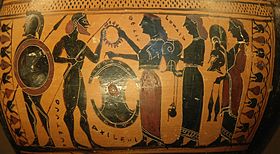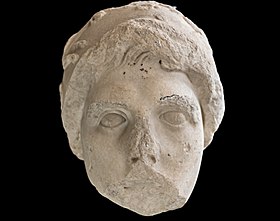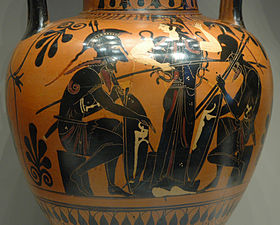Achilles
![]()
Achilles is a redirect to this article. For other meanings, see Achilles (disambiguation).
Achilleus (German Achill or Latinized Achilles; ancient Greek and modern Greek scholarly Ἀχιλλεύς [Akhilleús] [/akʰilleǔ̯s/], modern Greek vernacular Αχιλλέας) is a nearly invulnerable hero of the Greeks (Achaeans) before Troy in Greek mythology and the main hero of Homer's Iliad. He is the son of Peleus, king of Phthia in Thessaly, and the sea nymph Thetis.
He is often referred to by the attributes "Pelide" or "Peleiade" (son of Peleus) or "Aiakide" (descendant of Aiakos), which are reminiscent of his ancestors.
In the most recent version of the birth saga Thetis dips him into the underworld river Styx, which made him invulnerable. His heel, however, by which Thetis held him, was not wetted and therefore remained vulnerable. He was raised by the centaur Cheiron, who instructed him in the arts of war, music and medicine. Faced with a choice of fate, he preferred a short but glorious life to a long but lackluster one. His mother hid him in the royal court of Lycomedes to keep him from participating in the Trojan War. But Odysseus discovered Achilles, after which he and his best friend Patroclus took part in the Greek war campaign. In the tenth year of the war, a quarrel with Agamemnon escalated so that he stayed away from the battle: this incident is sung about as the "Wrath of Achilleus" in the Iliad. The death of Patroclus drove him to take up arms again to avenge him on Hector, the greatest hero of the Trojans. Shortly after Achilles killed Hector, he met his death when he was struck on his vulnerable heel by an arrow from Paris, which the god Apollo directed there.
The Achilles tradition consists of numerous texts from different times. In them, partly different incidents are told, which partly contradict each other and evaluate Achilles' behaviour differently.
Achilles was revered in the Greek world as a godlike hero. A handsome and courageous representative of a lofty code of honor, he embodies "the ideal morality of a consummate Homeric noble."

Thetis gives her son Achilles his new weapons forged by Hephaestus. Detail of a black figure painting on an Attic hydria 575-550 BC, Louvre

Head of Achilles from the Achilles-Penthesilea group, Roman copy of a Hellenistic original, Vatican Museums Inv. 4632
Etymology
Achilleus is often called "Pelide", "Aiakide" or even "Pyruus", epithets that recall his ancestors. The etymology of his actual name is unknown. Achilleus already appears as a proper name in Mycenaean Greek on two Linear B documents (Knossos Vc 106, Pylos FN 79.2) around 1200 B.C. in the spelling a-ki-re-u. However, the bearers of the name are real persons who did not belong to an elevated class. The question of the origin of his name was already raised in antiquity:
Pseudo-Apollodor explains that his name means 'who has no lips' - as a compound of the ancient Greek negation prefix α- a- and χεῖλος kheĩlos, German 'Lippe', because his lips would never have sucked on a mother's breast. Lycophron traces the name to the same root, but on the grounds that Achilles had lost a lip to fire after his birth.
Another ancient hypothesis gives the name the sense of 'he whose army is afflicted', from ancient Greek ἄχος ákhos, German 'sorrow, grief' and λαός laós, German 'army, the multitude of warriors'. In fact, the figure of Achilles is linked with sorrow: The Achaeans feel it when he retreats from battle and when he dies. An interpretation based on the same root ἄχος ákhos interprets the name as 'he who caused sorrow to the Trojans (i.e. the Illians)'.
Modern considerations interpret the root αχελ akhel as a reference to a water deity-with etymological parallels to the river deities Acheron and Acheloos-which is also supported by his descent from the sea deity Thetis and his battle with the scamander. Others trace the name back to Αχιλόγονος Achilógonos, German 'Schlangensohn', since his mother preferred to turn into a snake.

Achilles and Ajax playing, Attic black-figure amphora, ca. 510 B.C., Getty Villa (86.AE.81).
Interpretation
Despite his origin from Peleus and Thetis, Achilles is mortal. However, Homer describes the anger of the hero as an outflow of the divine. This has nothing in common with the rage and resentment of ordinary people, but is a holy anger, a divine passion. The other heroes of the Iliad are also possessed by mania, by warlike madness that blinds them - with the exception of Odysseus.
Achilles is a conflicted character, for he is free to respect the rites of heroes and the customs of men. This forces him to belong to no group, which gives him an aloof place in Homer's work.
This dichotomy of Achilles seems particularly inviting to identification. He is peace-loving at the bottom of his heart and hates war, but when he fights it is unstoppably and brutally; he appears heterosexual to some authors (Deidameia, Briseis, Polyxena), more homosexual to others (Patroclus); he vacillates between subordination to a common goal and complete self-will; he is young, beautiful and quick - and yet vulnerable; he is a feared fighter - and in distress flees into the arms of his mother. Already in Homer all these contradictions are united in his person, and yet he never gives the impression of a poetic construct. In this abundance of qualities, of contradictions, lies his special vitality: because his pride is offended, he goes on war strike. He returns to the theatre of war for a private motive: he wants to avenge his friend. He is apparently indifferent to the actual war aims, Troy and Helen. All other participants in the war are in the service of the war aims, but the fighter Achilleus realizes himself. For Hegel, Achilles embodies the ideal of the epic hero: "With Achilles one can say: this is a human being! - The versatility of noble human nature develops all its richness in this one individual."
Questions and Answers
Q: Who was Achilles?
A: Achilles was a hero of the Trojan War and the central character of Homer's Iliad. He was the leader of the Myrmidons, and is described as the greatest of all the Achaean warriors.
Q: Who were Achilles' parents?
A: Achilles' parents were the mortal hero Peleus and the Nereid Thetis.
Q: What is Achilles' most notable feat during the Trojan War?
A: Achilles' most notable feat during the Trojan War was his slaying of the Trojan prince Hector outside the gates of Troy, as revenge against Hector for killing his lover, Patroclus.
Q: How does the Iliad start?
A: The Iliad starts with a quarrel between Achilles and Agamemnon, the commander of the Greek forces, in the ninth year of the Trojan War.
Q: Who killed Achilles?
A: According to other sources, Achilles was killed near the end of the war by Paris, who shot him in the heel with an arrow. However, his death is not presented in the Iliad, as the poem ends with Hector's funeral.
Q: What was Achilles' role in the Greek forces?
A: Achilles was the leader of the Myrmidons and was described as the greatest of all the Achaean warriors, playing a crucial role in the Greek forces during the Trojan War.
Q: What was Achilles' motivation for killing Hector?
A: Achilles killed Hector as revenge for Hector's killing of his lover, Patroclus, during the Trojan War.
Search within the encyclopedia